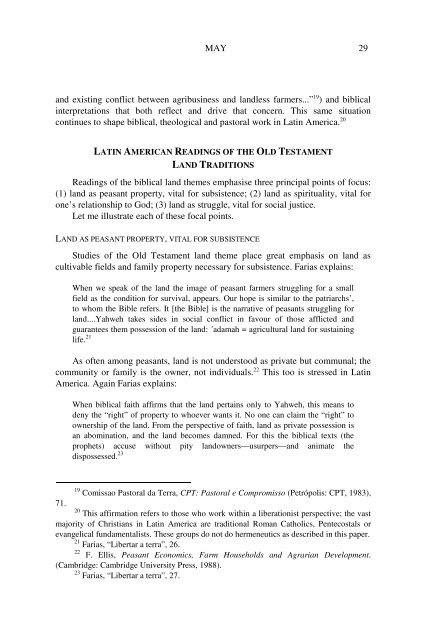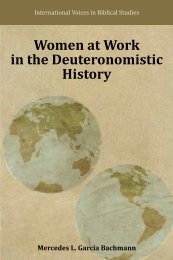Global Hermeneutics? - International Voices in Biblical Studies ...
Global Hermeneutics? - International Voices in Biblical Studies ...
Global Hermeneutics? - International Voices in Biblical Studies ...
Create successful ePaper yourself
Turn your PDF publications into a flip-book with our unique Google optimized e-Paper software.
MAY 29<br />
and exist<strong>in</strong>g conflict between agribus<strong>in</strong>ess and landless farmers...” 19 ) and biblical<br />
<strong>in</strong>terpretations that both reflect and drive that concern. This same situation<br />
cont<strong>in</strong>ues to shape biblical, theological and pastoral work <strong>in</strong> Lat<strong>in</strong> America. 20<br />
LATIN AMERICAN READINGS OF THE OLD TESTAMENT<br />
LAND TRADITIONS<br />
Read<strong>in</strong>gs of the biblical land themes emphasise three pr<strong>in</strong>cipal po<strong>in</strong>ts of focus:<br />
(1) land as peasant property, vital for subsistence; (2) land as spirituality, vital for<br />
one’s relationship to God; (3) land as struggle, vital for social justice.<br />
Let me illustrate each of these focal po<strong>in</strong>ts.<br />
LAND AS PEASANT PROPERTY, VITAL FOR SUBSISTENCE<br />
<strong>Studies</strong> of the Old Testament land theme place great emphasis on land as<br />
cultivable fields and family property necessary for subsistence. Farias expla<strong>in</strong>s:<br />
When we speak of the land the image of peasant farmers struggl<strong>in</strong>g for a small<br />
field as the condition for survival, appears. Our hope is similar to the patriarchs’,<br />
to whom the Bible refers. It [the Bible] is the narrative of peasants struggl<strong>in</strong>g for<br />
land....Yahweh takes sides <strong>in</strong> social conflict <strong>in</strong> favour of those afflicted and<br />
guarantees them possession of the land: ´adamah = agricultural land for susta<strong>in</strong><strong>in</strong>g<br />
life. 21<br />
As often among peasants, land is not understood as private but communal; the<br />
community or family is the owner, not <strong>in</strong>dividuals. 22 This too is stressed <strong>in</strong> Lat<strong>in</strong><br />
America. Aga<strong>in</strong> Farias expla<strong>in</strong>s:<br />
When biblical faith affirms that the land perta<strong>in</strong>s only to Yahweh, this means to<br />
deny the “right” of property to whoever wants it. No one can claim the “right” to<br />
ownership of the land. From the perspective of faith, land as private possession is<br />
an abom<strong>in</strong>ation, and the land becomes damned. For this the biblical texts (the<br />
prophets) accuse without pity landowners—usurpers—and animate the<br />
dispossessed. 23<br />
19<br />
Comissao Pastoral da Terra, CPT: Pastoral e Compromisso (Petrópolis: CPT, 1983),<br />
71.<br />
20<br />
This affirmation refers to those who work with<strong>in</strong> a liberationist perspective; the vast<br />
majority of Christians <strong>in</strong> Lat<strong>in</strong> America are traditional Roman Catholics, Pentecostals or<br />
evangelical fundamentalists. These groups do not do hermeneutics as described <strong>in</strong> this paper.<br />
21<br />
Farias, “Libertar a terra”, 26.<br />
22<br />
F. Ellis, Peasant Economics, Farm Households and Agrarian Development.<br />
(Cambridge: Cambridge University Press, 1988).<br />
23<br />
Farias, “Libertar a terra”, 27.




